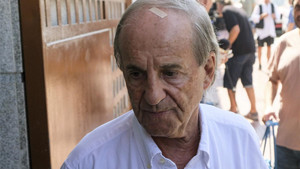Según un artículo de la revista Newsweek, se requiere que Felipe VI, el Preparado, abdique, para solventar la crisis constitucional.
OPINION
KING FELIPE SHOULD ABDICATE TO SOLVE SPAIN’S CONSTITUTIONAL CRISIS
By José Buscaglia On Friday, October 20, 2017 - 12:01

King Felipe VI of Spain and Queen Letizia of Spain at the Principe Felipe Auditorium, October 19, 2017 in Oviedo, Spain.PHOTO: CARLOS ALVAREZ/GETTY
Recent events point to the possibility that Catalonia, one of Spain's most prosperous regions, could declare independence within the next few weeks.
This would be a dangerous scenario for Spain, where regions with similar qualms with the central government in Madrid, most prominently the Basque nation, could soon follow suit, leaving the country significantly diminished if not irreparably broken as a viable nation-state.
The prospects of a successful breakup of Catalonia from Spain poses challenges to almost all the principal countries in Europe where, both inside the EU and beyond, there are over eighty separatists movements big and small.
Keep Up With This Story And More By Subscribing Now
To be sure, the breakup of the first Western modern nation state to surface in 1492 united under one crown and one religion, and the fourteenth largest economy in the world today, would have serious repercussions around the globe.
Clearly there are aspects to nationalism that respond to our primal tribal instincts as primates as well as to emotions that defy reason. In the Catalan case, however, the growing number of people who have joined the pro-independence movement in recent years is inversely proportional to the systematic undermining of Catalan freedoms by the central government in Madrid over the past two decades.
In 2005, the Catalan parliament passed a territorial bill that recognized Catalonia as a distinct nation under the Spanish state, giving it greater fiscal control over its economy. That bill was dismissed by the Constitutional Court in Madrid.
What came after were successive requests by the government in Barcelona to have Madrid agree to an open vote on the question of Catalonia remaining in Spain or going independent. To this day Madrid has refused to engage in that conversation forcing the Catalans to hold several plebiscites on the question.
This October 1, notwithstanding a major crackdown and the type of police brutality the likes of which had not been seen in Spain since the days of the Francoist dictatorship (1939-1975), 43 percent of eligible voters went to the polls and 90 percent of them voted for independence.
The central government called the vote illegal and unconstitutional warning Barcelona that it would not tolerate a "unilateral declaration of independence".
The terminology employed by Madrid makes no sense. When has a declaration of independence been anything but unilateral?
Faced with an issue that could lead to the breakup of the country, the current conservative prime minister, Mariano Rajoy, has responded with the typical Spanish Quixotesque attitude, appearing totally nonchalant in the face of impending doom.
He would attend to the Catalan question next week, he said, whenever he could find some time. Next week is now and the head of the Catalan parliament, Charles Puigdemont, has just declared that Catalonia is unequivocally moving towards independence in response to the results of the October 1 referendum. He has asked his backers to give Madrid one last chance to come to the negotiating table.
Rajoy responded by threatening to take control of the government in Catalonia and his chief deputy is already hinting of the possibility of sending in the military.
Like Rajoy, the other two leaders of major political parties in Madrid appear equally unwilling to come to the table. Pedro Sánchez, head of the liberal Socialist Party, excels in speaking at length without saying much. To the left of him, Pablo Iglesias, leader of Podemos Party, simply thinks of the Catalan Question as a way to destabilize the government in preparation for a putsch.
Meanwhile, in Barcelona, the governing pro-independence coalition is composed of a handful of shrewd strategists. Their coalition is also a truly workable national movement in that it incorporates all sectors of society, from the pro-business conservatives, passing through the leftist republican coalition to the anti-system radicals as well as major institutions in civil society.
Following the vote on October 1, King Felipe VI made a rare appearance on national TV. He called on the Catalan government to return to constitutional legality and made no apologies for the terror campaign launched by the national police. Neither did he address his Catalan subjects in their own language.
At that point Felipe stopped being the king of all Spaniards. As relations between Madrid and Barcelona continue to deteriorate, he would do well to consider making the ultimate sacrifice to save his country from itself.
Keeping Catalonia in Spain by taking Spain out of Catalonia is therefore directly tied to making Felipe a regular citizen of the country like everybody else. His abdication would lead to the proclamation of the Third Spanish Republic, to new governments in Madrid and Barcelona, and to a constitutional assembly that could result in the creation of a multi-national federal state where Andalusians, Basques, Canarians, Castilians, Catalans and others could reconcile with their past as they look to reclaim and refashion the old notion of the many Spains, or Las Españas.
Any other alternatives at this point would seem to lead nowhere but to saying goodbye to Spain.
Dr. José Buscaglia is the Chair of Cultures, Societies and Global Studies at Northeastern University.
Loading ...
RELATED STORIES
PRINT & DIGITAL
Weekly magazine, delivered
Daily Newsletter
Website access
SUBSCRIBE
PRINT ONLY
Weekly magazine, delivered
Daily Newsletter
Website access
SUBSCRIBE
DIGITAL ONLY
Free access to 40+ digital editions
Website access
Daily Newsletter
SUBSCRIBE
© Copyright 2017 NEWSWEEK LLC
OPINION
KING FELIPE SHOULD ABDICATE TO SOLVE SPAIN’S CONSTITUTIONAL CRISIS
By José Buscaglia On Friday, October 20, 2017 - 12:01

King Felipe VI of Spain and Queen Letizia of Spain at the Principe Felipe Auditorium, October 19, 2017 in Oviedo, Spain.PHOTO: CARLOS ALVAREZ/GETTY
Recent events point to the possibility that Catalonia, one of Spain's most prosperous regions, could declare independence within the next few weeks.
This would be a dangerous scenario for Spain, where regions with similar qualms with the central government in Madrid, most prominently the Basque nation, could soon follow suit, leaving the country significantly diminished if not irreparably broken as a viable nation-state.
The prospects of a successful breakup of Catalonia from Spain poses challenges to almost all the principal countries in Europe where, both inside the EU and beyond, there are over eighty separatists movements big and small.
Keep Up With This Story And More By Subscribing Now
To be sure, the breakup of the first Western modern nation state to surface in 1492 united under one crown and one religion, and the fourteenth largest economy in the world today, would have serious repercussions around the globe.
Clearly there are aspects to nationalism that respond to our primal tribal instincts as primates as well as to emotions that defy reason. In the Catalan case, however, the growing number of people who have joined the pro-independence movement in recent years is inversely proportional to the systematic undermining of Catalan freedoms by the central government in Madrid over the past two decades.
In 2005, the Catalan parliament passed a territorial bill that recognized Catalonia as a distinct nation under the Spanish state, giving it greater fiscal control over its economy. That bill was dismissed by the Constitutional Court in Madrid.
What came after were successive requests by the government in Barcelona to have Madrid agree to an open vote on the question of Catalonia remaining in Spain or going independent. To this day Madrid has refused to engage in that conversation forcing the Catalans to hold several plebiscites on the question.
This October 1, notwithstanding a major crackdown and the type of police brutality the likes of which had not been seen in Spain since the days of the Francoist dictatorship (1939-1975), 43 percent of eligible voters went to the polls and 90 percent of them voted for independence.
The central government called the vote illegal and unconstitutional warning Barcelona that it would not tolerate a "unilateral declaration of independence".
The terminology employed by Madrid makes no sense. When has a declaration of independence been anything but unilateral?
Faced with an issue that could lead to the breakup of the country, the current conservative prime minister, Mariano Rajoy, has responded with the typical Spanish Quixotesque attitude, appearing totally nonchalant in the face of impending doom.
He would attend to the Catalan question next week, he said, whenever he could find some time. Next week is now and the head of the Catalan parliament, Charles Puigdemont, has just declared that Catalonia is unequivocally moving towards independence in response to the results of the October 1 referendum. He has asked his backers to give Madrid one last chance to come to the negotiating table.
Rajoy responded by threatening to take control of the government in Catalonia and his chief deputy is already hinting of the possibility of sending in the military.
Like Rajoy, the other two leaders of major political parties in Madrid appear equally unwilling to come to the table. Pedro Sánchez, head of the liberal Socialist Party, excels in speaking at length without saying much. To the left of him, Pablo Iglesias, leader of Podemos Party, simply thinks of the Catalan Question as a way to destabilize the government in preparation for a putsch.
Meanwhile, in Barcelona, the governing pro-independence coalition is composed of a handful of shrewd strategists. Their coalition is also a truly workable national movement in that it incorporates all sectors of society, from the pro-business conservatives, passing through the leftist republican coalition to the anti-system radicals as well as major institutions in civil society.
Following the vote on October 1, King Felipe VI made a rare appearance on national TV. He called on the Catalan government to return to constitutional legality and made no apologies for the terror campaign launched by the national police. Neither did he address his Catalan subjects in their own language.
At that point Felipe stopped being the king of all Spaniards. As relations between Madrid and Barcelona continue to deteriorate, he would do well to consider making the ultimate sacrifice to save his country from itself.
Keeping Catalonia in Spain by taking Spain out of Catalonia is therefore directly tied to making Felipe a regular citizen of the country like everybody else. His abdication would lead to the proclamation of the Third Spanish Republic, to new governments in Madrid and Barcelona, and to a constitutional assembly that could result in the creation of a multi-national federal state where Andalusians, Basques, Canarians, Castilians, Catalans and others could reconcile with their past as they look to reclaim and refashion the old notion of the many Spains, or Las Españas.
Any other alternatives at this point would seem to lead nowhere but to saying goodbye to Spain.
Dr. José Buscaglia is the Chair of Cultures, Societies and Global Studies at Northeastern University.
Loading ...
RELATED STORIES
- Spain Should Let the Catalans Decide Their Own Future
- Tel Aviv Diary: Trump’s Middle East Policy is in Chaos
- Will We Learn to Live With Trump’s Constructive Chaos?
PRINT & DIGITAL
Weekly magazine, delivered
Daily Newsletter
Website access
SUBSCRIBE
PRINT ONLY
Weekly magazine, delivered
Daily Newsletter
Website access
SUBSCRIBE
DIGITAL ONLY
Free access to 40+ digital editions
Website access
Daily Newsletter
SUBSCRIBE
© Copyright 2017 NEWSWEEK LLC


